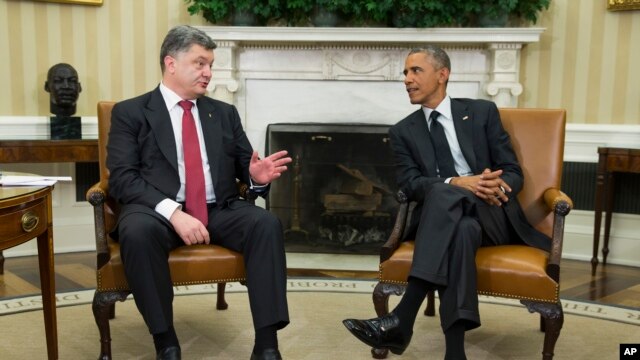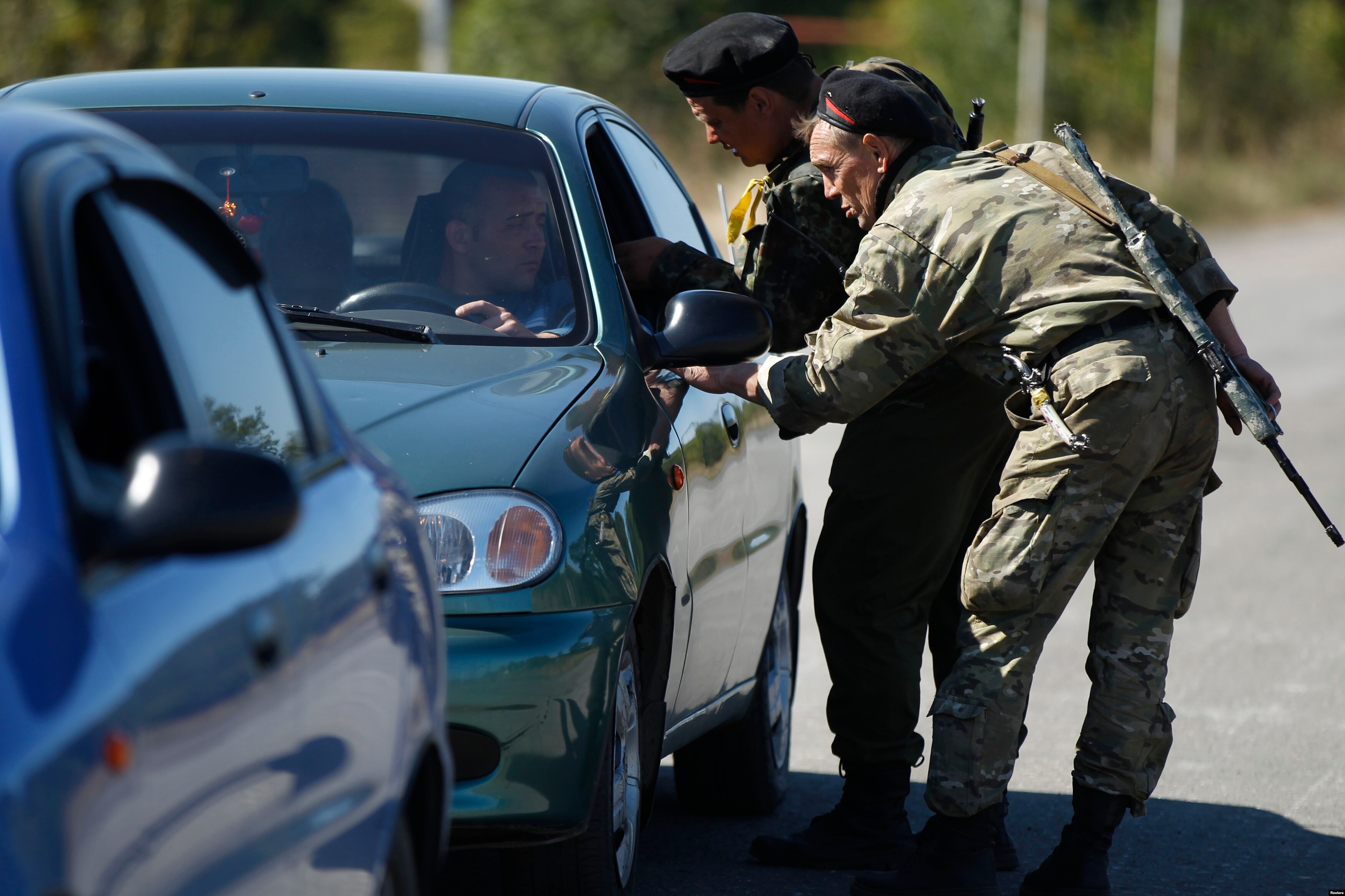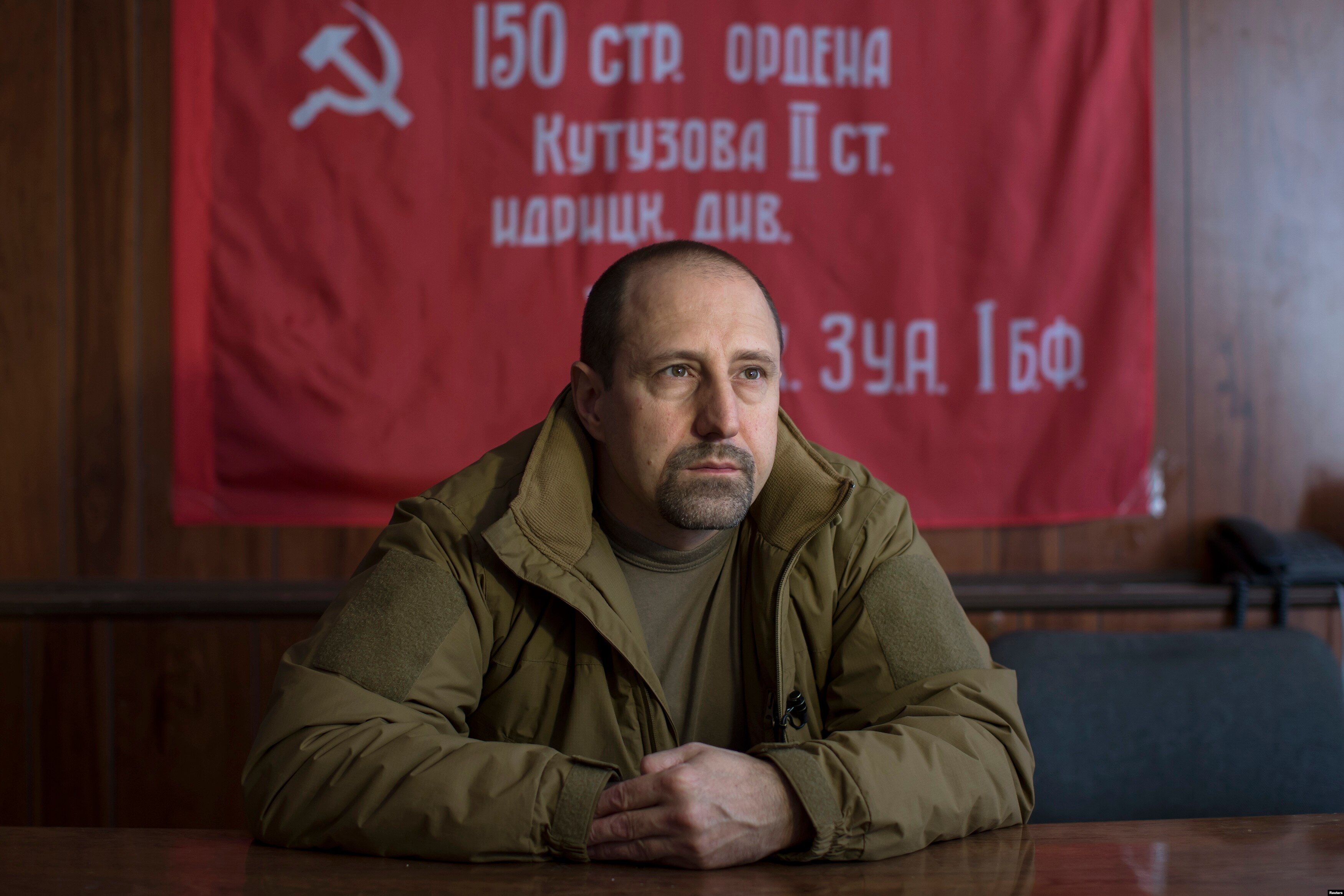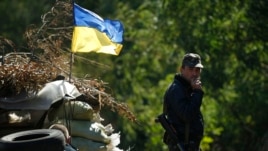Obama Reaffirms Commitment to Ukraine
President Barack Obama meets with Ukrainian President Petro Poroshenko in the Oval Office of the White House in Washington, Sept. 18, 2014.
Last updated on: September 18, 2014 11:05 AM
President Barack Obama has offered additional security assistance to Ukraine in its standoff with Russia.
Speaking Thursday at the White House following talks with visiting President Petro Poroshenko at his side, Obama announced an additional $53 million in fresh aid to Ukraine - $46 million to bolster Ukraine's security and $7 million in humanitarian aid.
Obama praised the Ukrainian leader for brokering a recent cease-fire in the conflict in the county’s east and for pushing through legislation granting areas controlled by pro-Russia rebels broader self-rule.
Affirming once again that Ukraine’s sovereignty and territorial integrity are not negotiable, Obama said that the U.S. will continue to mobilize the international community to seek a diplomatic solution to the conflict.
“Russia cannot dictate the terms,” Obama assured Poroshenko, saying that he has “a strong friend not only in me personally” but also strong bipartisan support in Congress.
Poroshenko addresses Congress
Earlier Thursday, Ukraine’s president, Petro Poroshenko, whose country has seen part of its territory annexed by Russia and another part destabilized by pro-Russian separatists, has called on U.S. lawmakers to continue to support Ukraine in its quest for freedom and democracy.
Speaking in Washington before a joint session of Congress ahead of his meeting with President Barack Obama later Thursday, Poroshenko thanked lawmakers for the support and solidarity the United States has already shown Ukraine in the face of foreign aggression.
“There are moments in history when freedom is more than just a political concept. At that moment, freedom becomes the ultimate choice which defines who you are, as a person – and as a nation,” Poroshenko said, referrering to his country’s struggle to protect its territorial integrity.
'Stabbed in the back' by Russia
Pointing a finger at Russia, Poroshenko told U.S. lawmakers that Ukraine, which voluntarily surrendered its nuclear arsenal, the world’s third-largest at the time, in return for security assurances “was stabbed in the back by one of the countries [which] gave her those assurances.”
Poroshenko was referring to the 1994 Budapest Memorandum, signed by Russia, the U.S. and Britain, in which Ukraine received guarantees on its sovereignty and territorial integrity in return for giving up its nuclear weapons.
Speaking Thursday at the White House following talks with visiting President Petro Poroshenko at his side, Obama announced an additional $53 million in fresh aid to Ukraine - $46 million to bolster Ukraine's security and $7 million in humanitarian aid.
Obama praised the Ukrainian leader for brokering a recent cease-fire in the conflict in the county’s east and for pushing through legislation granting areas controlled by pro-Russia rebels broader self-rule.
Affirming once again that Ukraine’s sovereignty and territorial integrity are not negotiable, Obama said that the U.S. will continue to mobilize the international community to seek a diplomatic solution to the conflict.
“Russia cannot dictate the terms,” Obama assured Poroshenko, saying that he has “a strong friend not only in me personally” but also strong bipartisan support in Congress.
Poroshenko addresses Congress
Earlier Thursday, Ukraine’s president, Petro Poroshenko, whose country has seen part of its territory annexed by Russia and another part destabilized by pro-Russian separatists, has called on U.S. lawmakers to continue to support Ukraine in its quest for freedom and democracy.
Speaking in Washington before a joint session of Congress ahead of his meeting with President Barack Obama later Thursday, Poroshenko thanked lawmakers for the support and solidarity the United States has already shown Ukraine in the face of foreign aggression.
“There are moments in history when freedom is more than just a political concept. At that moment, freedom becomes the ultimate choice which defines who you are, as a person – and as a nation,” Poroshenko said, referrering to his country’s struggle to protect its territorial integrity.
'Stabbed in the back' by Russia
Pointing a finger at Russia, Poroshenko told U.S. lawmakers that Ukraine, which voluntarily surrendered its nuclear arsenal, the world’s third-largest at the time, in return for security assurances “was stabbed in the back by one of the countries [which] gave her those assurances.”
Poroshenko was referring to the 1994 Budapest Memorandum, signed by Russia, the U.S. and Britain, in which Ukraine received guarantees on its sovereignty and territorial integrity in return for giving up its nuclear weapons.
Acknowledging long standing ovations by lawmakers during his nearly one-hour speech, Poroshenko called on the U.S. to grant Ukraine a special status to help it deal with the aggression it faces.
“I strongly encourage the United States to give Ukraine a special security and defense status which [would] reflect the highest level of interaction with a non-NATO ally,” he said.
“I strongly encourage the United States to give Ukraine a special security and defense status which [would] reflect the highest level of interaction with a non-NATO ally,” he said.
Pointing to the threats and challenges confronting Ukraine, Poroshenko said that they are not Ukraine’s alone, and that the world must make a"choice between civilization and barbarism."
“The free world must stand its ground. And with America’s help, it will,” he said.
Invoking the slogan of the American Revolution “live free or die,” and referring to street protests which brought down Ukraine’s previous Moscow-backed government earlier this year, Poroshenko said that it was the same slogan that inspired Ukrainians to rise up for their own “revolution of dignity.”
Invoking the slogan of the American Revolution “live free or die,” and referring to street protests which brought down Ukraine’s previous Moscow-backed government earlier this year, Poroshenko said that it was the same slogan that inspired Ukrainians to rise up for their own “revolution of dignity.”
Military aid
Poroshenko, who declared a cease-fire with pro-Russian rebels in eastern Ukraine on September 5, in meetings with U.S. officials, was widely expected to press for additional military assistance beyond the $70 million promised by Washington late last month.
In his speech before Congress, he said that with his country seeking a "strong modern army," it needs both non-lethal and lethal military aid.
Poroshenko, who declared a cease-fire with pro-Russian rebels in eastern Ukraine on September 5, in meetings with U.S. officials, was widely expected to press for additional military assistance beyond the $70 million promised by Washington late last month.
In his speech before Congress, he said that with his country seeking a "strong modern army," it needs both non-lethal and lethal military aid.
A bill to provide Ukraine with both non-lethal and lethal support has already been drafted in Congress, according to Congresswoman Marcy Kaptur, co-chair of the Ukraine Congressional Caucus and co-author of the document.
Speaking to VOA following Poroshenko’s speech, she said that he has “wall-to-wall” support in the U.S. legislature.
Speaking to VOA following Poroshenko’s speech, she said that he has “wall-to-wall” support in the U.S. legislature.
The White House has so far stopped short of supplying lethal aid to the Kyiv government, choosing instead to focus on punishing Moscow with wide-ranging economic sanctions for its annexation of Crimea and its support of a separatist rebellion in eastern Ukraine. Moscow is denying involvement.
European Union nations, Canada, Australia, Japan and Switzerland have also imposed sanctions against Moscow.
European Union nations, Canada, Australia, Japan and Switzerland have also imposed sanctions against Moscow.
According to estimates, some 3,000 people have died in the fighting in eastern Ukraine and more than a quarter million people have been driven from their homes.
More threats from Putin?
Russia’s president has allegedly issued a threat to former Soviet bloc countries that are now part of the European Union and NATO, in addition to one he voiced earlier with regard to Ukraine.
“If I wanted to, within two days Russian troops could be not only in Kyiv, but also in Riga, Vilnius, Tallinn, Warsaw or Bucharest,” Ukrainian President Petro Poroshenko cited Vladimir Putin as telling him in a conversation, German newspaper Sueddeutsche Zeitung reported Thursday.
Poroshenko shared information about the threats with European Commission President José Manuel Barroso during the latter’s visit to Kyiv last Friday, the paper said citing a German Foreign Ministry document.
Putin had earlier made a similar verbal threat against the Ukrainian capital in a telephone call with Barosso, when he claimed to be able to “take Kyiv” within two weeks, the European Commission president said in late August.
The Kremlin has dismissed the latest report as misinformation. Commentig earlier on Barrosso's statements, it expressed its dismay over him making public the contents of what it referred to as private conversations.
According to Ukrainian media, Poroshenko's office has not confirmed the report.
More threats from Putin?
Russia’s president has allegedly issued a threat to former Soviet bloc countries that are now part of the European Union and NATO, in addition to one he voiced earlier with regard to Ukraine.
“If I wanted to, within two days Russian troops could be not only in Kyiv, but also in Riga, Vilnius, Tallinn, Warsaw or Bucharest,” Ukrainian President Petro Poroshenko cited Vladimir Putin as telling him in a conversation, German newspaper Sueddeutsche Zeitung reported Thursday.
Poroshenko shared information about the threats with European Commission President José Manuel Barroso during the latter’s visit to Kyiv last Friday, the paper said citing a German Foreign Ministry document.
Putin had earlier made a similar verbal threat against the Ukrainian capital in a telephone call with Barosso, when he claimed to be able to “take Kyiv” within two weeks, the European Commission president said in late August.
The Kremlin has dismissed the latest report as misinformation. Commentig earlier on Barrosso's statements, it expressed its dismay over him making public the contents of what it referred to as private conversations.
According to Ukrainian media, Poroshenko's office has not confirmed the report.
Russia trade sanctions
Also on Thursday, President Putin said Western sanctions against Russia violated the principles of the World Trade Organization and the main way to combat them was to develop the domestic market.
At a meeting with senior officials, Putin said Russia had no intention of punishing the West for the sanctions, imposed over Moscow's role in Ukraine, and said instead they had challenged Russia to strengthen its economy, boost competition and spur lending.
“In taking responsive measures, we first of all think about our own interests regarding the task of development and protecting our producers and markets from unfair competition,” Putin said.
“And our main goal is to use one of Russia's main competitive advantages - a large domestic market, and to fill it with high-quality goods produced by our nation's firms," he added.
The Ukraine crisis has plunged ties between the West and Russia to their lowest since the Cold War, and Putin criticized countries that imposed sanctions for violating the spirit of the WTO, which he said embodied free and fair economic competition.
Russia joined the WTO in 2012 after 18 years of on-and-off negotiations on the terms of its entry.
Countries enforcing trade sanctions do not have to justify them at the WTO unless they are challenged in a trade dispute. Justifications for restricting trade can range from environmental and health reasons to religious scruples.
Human rights violations
Meanwhile, the international watchdog Human Rights Watch is calling on the United States to urge Ukraine to reign in human rights violations allegedly being committed in the country's east.
The rights group has accused both sides in the conflict of carrying out indiscriminate acts that have killed or injured civilians and destroyed civilian property.
On Wednesday, Ukraine ordered its armed forces to maintain "full combat readiness" near the Russian border, after new fighting and reports of at least 12 more fatalities further strained an already-shaky cease-fire with pro-Russian separatists.
The casualties were the first reported since Ukraine's parliament voted Tuesday to grant rebels temporary self-rule in the parts of the Donetsk and Luhansk regions already under their control.
That temporary self-rule concession and a broad amnesty for many rebel fighters were Ukraine's strongest public peace overtures since separatists launched their rebellion against Kyiv's rule five months ago.
Cindy Saine contributed to this report from Capitol Hill. VOA
Cindy Saine contributed to this report from Capitol Hill. VOA









No comments:
Post a Comment